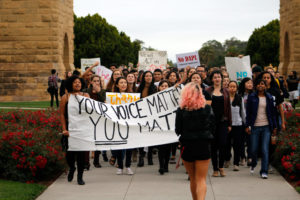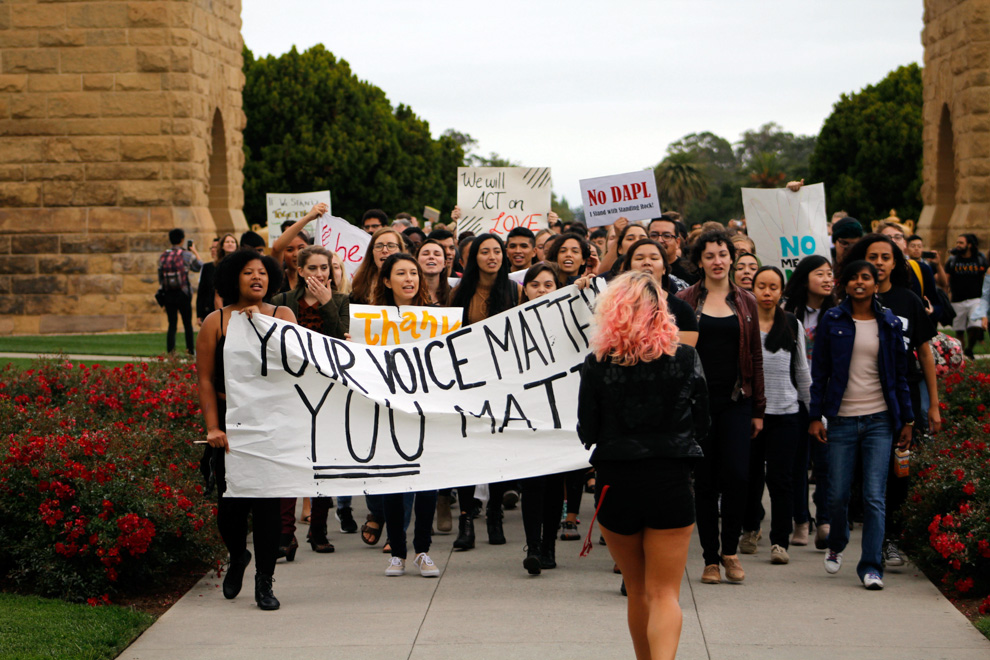In anticipation of Donald Trump’s presidency, students are asking the University to make campus a sanctuary for students, staff and their family members who may face deportation under new immigration policies.
Much like a sanctuary city, a sanctuary campus would work towards protecting undocumented community members by implementing policies to protect students and staff from immigration officers.

Stanford’s petition, in the form of a letter addressed to President Marc Tessier-Lavigne and Provost John Etchemendy, has already gained over 2,000 signatures. The letter demands that the university take “concrete action” to “support and protect the people within our community.” It suggests that the university may be able to deny the Palo Alto Police Department permission to enter campus and highlights that U.S. Immigration and Customs Enforcement may be restricted in their actions on campus, as schools are considered “sensitive locations.”
Seventy-two colleges in the U.S. currently have sanctuary campus petitions, including five Ivy League schools and 12 other California colleges, four of which are part of the UC system.
Renata Martin, a first-year biology Ph.D. candidate, spearheaded Stanford’s petition. Martin adapted the petition for Stanford based on a letter from the students of her alma mater, Brown University, with the help of Kyle Cromer, a postdoc in the Department of Pediatrics.
“Clearly, the school would lose a lot of talent,” Martin said. “You see what is really the face of an undocumented immigrant here. Trump talked [about undocumented people] as criminals, rapists, terrible things, but really we have great students across fields who want to make a difference. It is important to raise awareness on Stanford’s campus; we have undocumented students here that are like you and may lose everything.”
Martin explained that she has particular interest in the wellbeing of the undocumented community at Stanford, as she previously was an undocumented student. After attending a community college that had an immigration-status-blind admissions policy, Martin was able to go to Brown University in 2012 with a Jack Kent Cooke Scholarship, one of the few scholarships programs available for undocumented students.
“The barriers undocumented students go through just to get to a university are insane,” Martin said.
According to Martin, undocumented students often find themselves unable to get work authorization, take part in research opportunities, apply for scholarships or even legally drive. This makes attending college particularly challenging for low-income, undocumented students.
The Deferred Action for Childhood Arrivals (DACA) policy helps to alleviate some of those barriers for undocumented students. Passed by President Obama in 2012, DACA gives certain children of undocumented immigrants protection from imminent deportation as well as a temporary work permit.
President-elect Donald Trump has talked about deporting illegal immigrants, saying that he plans to have the estimated two to three million illegal immigrants who have committed crimes removed from the United States. Particularly affecting undocumented students, Trump might reverse DACA
In a statement released on behalf of the university on Tuesday, Vice President for University Communications Lisa Lapin said that Stanford, while in favor of the DREAM Act, would not be commenting on the petition to make the school a sanctuary for undocumented students.
“There are also many uncertainties right now around national issues, including immigration policy,” the statement read. “Stanford has long supported the DREAM Act to enable undocumented students to attend our institution and apply for citizenship. We do not know and cannot speculate about what laws or policies may be adopted in the future, or what the impact at Stanford might be. As a result, we are not able to comment on or react to policy that is not yet formed nor likely to be enacted for some time.”
The Stanford community’s petition to make the university a sanctuary concludes by directly appealing to the university’s stated commitment to diversity.
“If we do nothing when Trump becomes President, then any stated commitments to diversity, justice and inclusion Stanford has made will prove themselves an empty ruse. This is not a moment when we can afford silence,” the letter concludes.
Contact Rebecca Aydin at raydin ‘at’ stanford.edu
